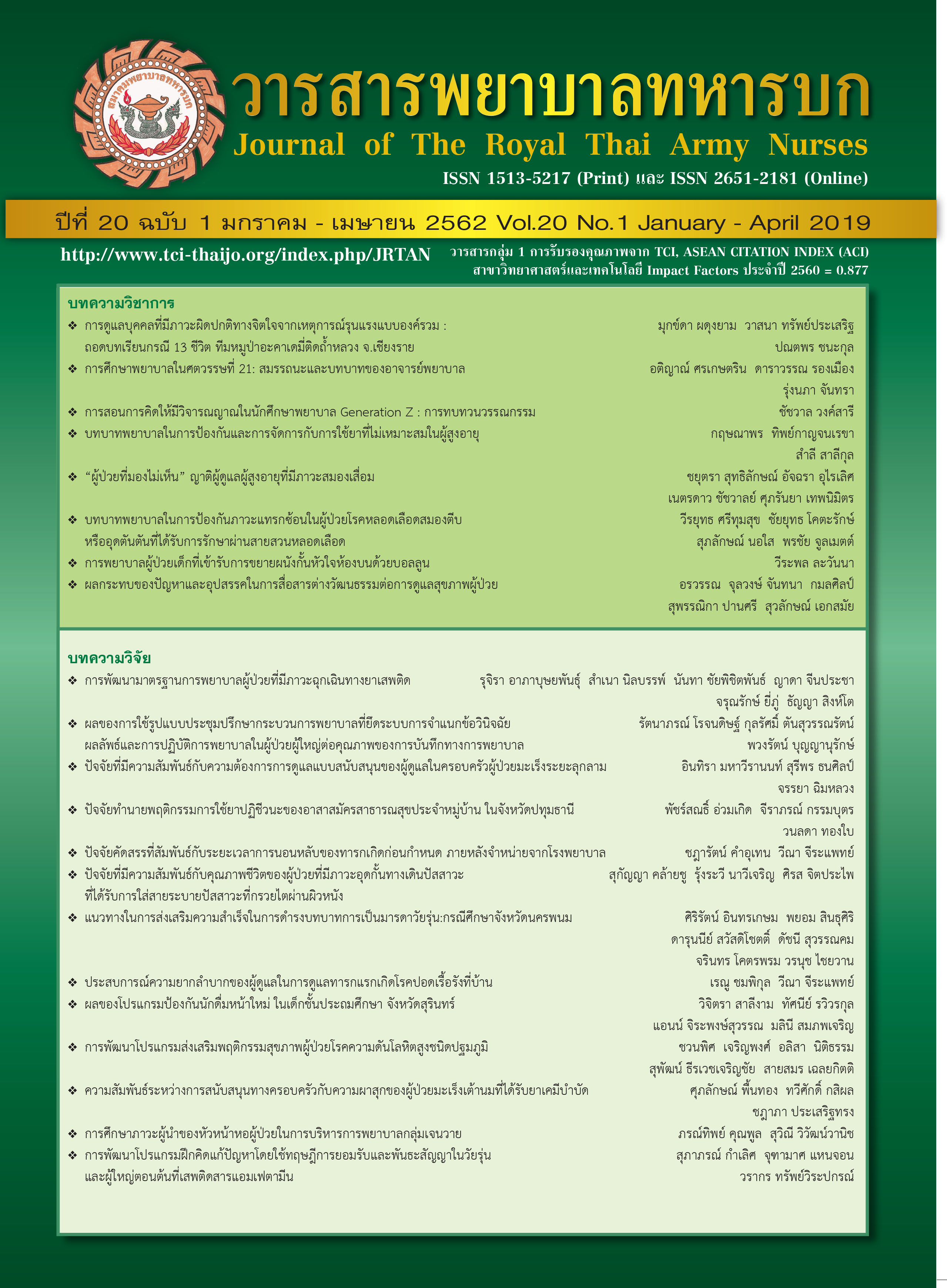Effectiveness of Parental Competencies and Developmental Stimulation Program by Playing on the Knowledge, Parental Child-Care, and Adaptive Behavior of Children with Autism
Keywords:
Program, Autism Parental Competencies, Child Playing, Children with AutismAbstract
This quasi-experimental study sought to examine the effectiveness of the parental competencies and developmental stimulation program by playing, on knowledge, parental behavior and adaptive behavior of children with autism. The autistic children (2-5 years) were randomly assigned to either the experimental or the control group. The parent and autistic children, who met the inclusion criteria and consented/assented to take part in the study, included 16 autistic children/parent dyads in the experimental group and 16 student/ parent dyads in the control group. Instruments for data collection included: An Autistic Child Care Knowledge Questionnaires, Autism Parental Behavior Questionnaires, and Vineland Adaptive Behavior Scales. Descriptive statistics, dependent t-test, independent t-test, and mean difference were used to test the effectiveness of the parental competencies and developmental stimulation program. The results demonstrated the positive effects of this program on parental behavior and adaptive behavior of children with autism. The results indicated statistical significance in mean difference scores of the Autism parental behavior and Autism adaptive behavior only (respectively, t = 4.76, p<.001; t = 2.67, p<.001). Moreover, findings presented enhancing of parental competencies and child positive adaptation and decrease in perceived caregiver burden in caring for their children with Autism. The program can help them understood children with autism, playing and learn to play with children. Playing should be applied for Autism developmental stimulation. Recommendations for further research include a larger sample size and a longer period for outcome measurements.
Downloads
References
Muys V, Rodger S, Bundy AC. Assessment of Playfulness in Children with Autistic Disorder: A Comparison of the Children’s Playfulness Scale and the Test of Playfulness. OTJR: Occupation, Participation and Health, 2006; 6(4):159-170.
Krivichian C, Ongarjsakulman R. Signs and Symptoms as per the Diagnosis of DSM-IV in Autistic Children, ASEAN Congress 2008: Yuwaprasartwaithayopathum Hospital. 2008. (in Thai)
Kliegman RM, et al. Nelson Textbook of PEDIATRICS. 9th ed. Philadelphia, 2011.
Tint, A. Weiss, JA. Family wellbeing of individuals with autism spectrum disorder: A scoping review. Autism. 2016 Apr;20(3):262-75.
Smith LE, Greenberg JS, Mailick MR. The family context of autism spectrum disorders: Influence on the behavioral phenotype and quality of life. Child and Adolescent Psychiatric Clinics of North America. 2014;23:143-155.
Srirath J, Rodcumdee B, Suktrakul S. Experiences of mothers of school-age autistic children perceiving affiliate stigma. Journal of The Royal Thai Army Nurse. 2018 May-Aug;19(2): 211-219. (in Thai)
Woodman AC, Smith, LE, Greenberg JS, Mailick MR. Change in Autism Symptoms and Maladaptive Behavior in Adolescence and Adulthood: The role of positive family processes. Journal of Autism and Developmental Disorders. 2015;45(1):111-126.
Carlos TJ, Deborah F, Julie W, Garland J, Margaret H, Lynn W, et al. Responses and sustained interactions in children with mental retardation and autism. Journal of Autism and Developmental Disorder. 2003;33(2):115–121.
Friedman MM, Bowden VR, Jones EG. Family nursing: Research, Theory, and practice. 5th ed. New Jersey: Upper Saddle River. 2003.
Feldman RS. Child Development. New Jersey: Simon & Schuster. 1998.
Bronfenbrenner, U. Ecological Models of Human Development. In International Encyclopedia of Education. 2nd ed. Oxford: Elsevier. 1994.
Chatmongkon C. Developing Vineland Adaptive Behavior Scales (VABS) for classify level of autistic spectrum: Yuwaprasartwaithayopathum Hospital.
2008. (in Thai)
Osborne LA, McHugh L, Saunders J, Reed P. Parenting stress reduce the effectiveness of early teaching intervention for autistic spectrum disorders. The Journal of Autism and Developmental Disorders, 2008. Jul;38(6): 1092-1103.
Stevens J. Applied multivariate statistics for the social science. 5th ed. NY: Routledge Taylor & Francis Group. 2009.
Kennedy-Behr B, Rodger S, Mickan S. Physical and Social Play of Preschool Children with and without Coordination difficulties: Preliminary finding. British Journal of Occupational Therapy. 2011 July;74(7):384-354.
Kernan M. Play as a context for early learning and development: A research paper. Executive Summary. Ireland: Commissioned by the National Council for Curriculum and Assessment, NSSA. 2007.
Jackson C. T., et al, (2003). Responses and sustained interactions in children with mental retardation and autism. Journal of Autism and Developmental Disorder, 33. 115–121.
Downloads
Published
How to Cite
Issue
Section
License
บทความหรือข้อคิดเห็นใดใดที่ปรากฏในวารสารพยาบาลทหารบกเป็นวรรณกรรมของผู้เขียน ซึ่งบรรณาธิการหรือสมาคมพยาบาลทหารบก ไม่จำเป็นต้องเห็นด้วย
บทความที่ได้รับการตีพิมพ์เป็นลิขสิทธิ์ของวารสารพยาบาลทหารบก
The ideas and opinions expressed in the Journal of The Royal Thai Army Nurses are those of the authors and not necessarily those
of the editor or Royal Thai Army Nurses Association.






